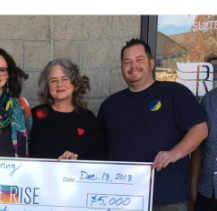A twisted tale of corruption in SLO County
July 31, 2021

Luis Gonzalez, Helios Dayspring and Sean Despain at a marijuana farm
By KAREN VELIE and JOSH FRIEDMAN
Shortly after local officials began crafting recreational marijuana regulations, San Luis Obispo County Supervisor Adam Hill and consultant Cory Black began courting growers who sought the help of a kingmaker. All the growers had to do was give Hill money, CalCoastNews exclusively reported.
Details of Hill’s corruption became public with the plea agreement of marijuana mogul Helios Dayspring in which he gave a detailed account of his illegal activities which included paying bribes to Hill. That plea deal and information gathered during a six-year, in-depth CalCoastNews investigation exposes the dirty underbelly of SLO County’s marijuana industry.

Supervisor Adam Hill
In the fall of 2016, while under a cloud of pay-to-play allegations, Hill spoke to a group of local marijuana farmers. The farmers asked Hill how they could gain his support. In response, Hill allegedly tossed a stack of envelopes on a table. He asked the attendees to put money in the white envelopes if they wanted his support, four persons who attended the meeting said.
Following the Sept. 26, 2016 meeting, Reggie Collins, one of the people who attended the meeting, sent out an email asking cannabis farmers to each give Hill $1,000 for his support.
“I am calling a special meeting to donate $ and help to his campaign,” Collins wrote. “My farm donated $1,000 recently. He is prepared to speak and attend our meeting. This is a mandatory donation for attendees.”
The next day, Collins sent out another email making clear what his plan was.
“My plan is to get the people who will pay to play,” Collins wrote.
While Collins confirmed that he had donated to Hill’s campaign, Hill did not report the donation from Collins on his financial disclosure filings. At the time, Hill did not respond to questions about the email or Collins’ claim of making the donation.
Black, a consultant who worked with both politicians and cannabis business owners, was somewhat of a matchmaker introducing cannabis business owners seeking favors to public officials willing to give them.
Hill argued for marijuana regulations that favored Black’s clients and county staffers then promoted them.
In Sept. 2016, the board of supervisors directed SLO County planning staff to construct an ordinance regulating the local marijuana industry. The staffers, however, came back with a proposed ordinance that matched looser rules Hill had proposed. It was not what staff had been directed to produce.
As county supervisors argued over cannabis regulations, growers worried they would be forced to stop cultivating cannabis while they waited for their applications to be processed. At that time, several farmers asked for a temporary abeyance ordinance that would allow them to grow without a permit.
Hill then introduced Dayspring to Black at a cannabis grow in Northern Santa Barbara County, where they discussed plans for the pay-to-play scheme, Sean Despain, a supervisor at the grow, told CalCoastNews. Hill and Black suggested Dayspring also work with then-Grover Beach Mayor John Shoals.
In addition to agreeing to take money to promote Dayspring’s business interests, Hill would act to thwart Dayspring’s competitors’ plans, Despain said.
At an event in Oct. 2016, Dayspring provided Hill his first bribe, three $1,000 money orders. Hill deposited the money into his personal account, according to Dayspring’s plea agreement. Dayspring gave Hill a total of $6,000 in 2016.
Over the next year, Dayspring paid Hill another $5,000 while also sending one of his delivery drivers to Hill’s Shell Beach home multiple times with complimentary cannabis products. In Nov. 2017, Hill voted to enact a 13-month abeyance ordinance, which allowed marijuana growers who had previously registered with the county to continue growing without a county permit.

Cory Black at a SLO County Board of Supervisors meeting listening to discussions on marijuana regulations
In 2018, Dayspring gave Hill about $5,000 in cash and marijuana. He pushed Hill and other county supervisors to vote to continue the abeyance after it was set to expire in Jan. 2019.
“It’s really important u guys extend the time frame for submission and don’t allow other people in yet.” Dayspring texted Hill on Dec. 10, 2018. “This affects all the properties that I just got investment into every one of them. If I am not deemed complete and get accepted I don’t get ownership in the land.”
The board then voted 5-0 to extend the abeyance ordinance with Hill seconding the motion.
While several county supervisors were considering banning outside pot grows, in early 2019, Dayspring gave Hill about $5,000 in cash outside a restaurant in Avila Beach. On March 26, 2019, Hill argued at a supervisors meeting against banning outdoor cultivation. He texted Dayspring from the dais.
“Had to keep these fuckers from going way beyond and it is exhausting!,” Hill texted Dayspring. “Where’s the industry support for my re-election??”
Three days later, Hill asks what Dayspring, who he refers to as a king, would do for his favorite supervisor’s birthday, according to a text.
The following day, Dayspring treated Hill to a birthday dinner at a restaurant in Pismo Beach. Dayspring also paid another $5,000 cash bribe, according to the plea agreement.
“[y]our industry should give me one giant French kiss wrapped in money after my work today,” Hill told Dayspring, according to the plea agreement.
Amid a battle to hold on to his supervisor seat, Hill asked Dayspring to host a fundraiser at his home on the outskirts of San Luis Obispo. The June 2019 event raised more than $13,000.
In late 2019, Dayspring asked for another extension of the abeyance ordinance which was set to expire. At a meeting in December, Hill moved to place the proposed extension on a future agenda.
On Jan. 14, 2020, the board voted 3-2 to approve another extension of the abeyance ordinance, with a twist. This time county staff included language that required growers to have paid their monthly taxes by Dec. 31, 2019 — before the December taxes were due. That allowed Dayspring to grow during the 2020 season while giving a crushing financial blow to many of his competitors who could not make the advance payments.
At the city level, multiple members of the marijuana industry alleged corruption in the permitting process which allegedly aided Dayspring in prevailing over applicants who appeared more qualified. In addition to allegations of bribery, Dayspring regularly contributed to the campaigns of city council members involved in the approval process.
In 2017, Dayspring’s partner told him Grover Beach Mayor Shoals had been pushing for a bribe in exchange for a permit, according to the plea agreement.
At a restaurant in Arroyo Grande where the three men met to discuss the process, Dayspring entered the number 100,000 on the calculator app on his phone and showed it to Shoals. Dayspring said it was for “two.” Shoals did not respond to the bribe at dinner, according to the plea agreement.
At about the same time, Dayspring allegedly dug up cash he had buried in the Creston area, and with the assistance of his employee Tony Brocking, Dayspring counted out and boxed $100,000 he planned to pay “the black mayor” to secure one of the city’s lucrative cannabis shop permits, Brocking said.

Helios Dayspring, rapper Xzibit and Grover Beach Mayor John Shoals outside a building Dayspring planned to house one of his marijuana businesses
In 2017, amid allegations of threats and backroom deals, the Grover Beach City Council awarded three marijuana shop permits to applicants who were political contributors to Shoals and then-Councilman Jeff Lee. All three had connections to Black.
Shoals and Lee veered from staff’s recommendations, selecting Dayspring’s Natural Healing Center, The Monarch and 805 Beach Breaks as their top three choices.
Following the vote, Dayspring’s business partner advised him not to pay Shoals any money because they had only received one permit, not the two they requested, according to the plea agreement.

Heidi Harmon and Helios Dayspring
Just weeks after the Nov. 2018 election, San Luis Obispo Mayor Heidi Harmon and Councilwoman Carlyn Christianson voted for a resolution establishing criteria for city staff to rank marijuana shop applicants.
The resolution created a point system that appeared to favor applicants, particularly Dayspring, who had donated money to Harmon, Christianson and Councilwoman Erica Stewart. The scoring process awarded points for having a history of supporting local community programs. Dayspring’s Natural Healing Center had put on several community events, including gatherings for children, despite it being a pot business.
At the time, Harmon was allegedly a regular guest at Dayspring’s Grover Beach pot dispensary, hanging out in the upstairs offices, one of Dayspring’s business partners said. During one of her visits, Dayspring allegedly ordered staff to give Harmon two bags containing approximately $1,000 worth of complimentary marijuana products.
Amid increasing allegations of pay-to-play, Dayspring and his marijuana brand Natural Healing Center hosted a fundraiser on Oct. 28, 2018 for eight politicians from local cities planning to open cannabis shops in the near future. The invitation asked attendees to RSVP through Nick Andre, a Natural Healing Center employee and a co-chair of the SLO Progressives, a group co-founded by Andre and Harmon.
Harmon, Christanson, Stewart, Morro Bay Mayor John Headding, Morro Bay Councilwoman Dawn Addis and now-Grover Beach Mayor Jeff Lee failed to disclosed the non-monetary donation, as required by state law, until after CalCoastNews reported on the covert fundraiser.

The city of San Luis Obispo selected three dispensaries to receive permits to operate marijuana shops in March 2019: Dayspring’s Natural Healing Center, Megan’s Organic Market and Elemental Wellness. All three of the dispensaries were major donors to the mayor and the two councilwomen.
In what has become standard practice, Morro Bay ignored the top ranking pot shop applicant — Connected Morro Bay Blvd. — and selected the fifth and sixth ranked permit applications. In Aug. 2019, Morro Bay City Manager Scott Collins awarded the permits to Natural Healing Center and Perfect Union, essentially reversing the recommendation list.
Connected Morro Bay Blvd. sued Morro Bay, arguing the city manipulated results and violated its own laws to award retail permits to a pair of Dayspring’s favored pot businesses. San Luis Obispo Superior Court Judge Ginger Garrett recently ruled in favor of Natural Healing Center and Perfect Union, finding that city officials had discretionary power when they passed over Connected Morro Bay Blvd.
Amid widespread allegations of corruption, on March 11, 2020, FBI agents served search warrants at the SLO County Government Center, Hill’s Shell Beach home and Dayspring’ home in rural SLO.
By the summer of 2020, Despain had stopped working with Dayspring, gained county approval for a pot farm and was providing information on the corruption to law enforcement, Despain said.
“They want to put me in witness protection,” Despain told a CalCoastNews reporter on July 22, 2020 at a restaurant in SLO. “I’m not leaving my farm.”
Despain died several hours later at his home in San Luis Obispo from an overdose of cocaine and antidepressants, according to a coroner’s report.
Hill was found dead in his home on Aug. 6, 2020. The county coroner ruled the death a suicide through an overdose of cocaine and antidepressants, according to a heavily redacted coroner’s report. Inside sources claim the county redacted medical information that showed Hill had health issues related to long-term heavy cocaine abuse.
Federal prosecutors charged Dayspring with one count of bribery and one count of filing a false tax return on July 28, 2021. Dayspring agreed to plead guilty to both felony offenses, pay $3.4 million in restitution to the IRS and cooperate in the government’s ongoing corruption investigation.
Support investigative reporting, support CalCoastNews
Subscribe with CalCoastNews and receive email notifications of breaking news and copies of documents not provided with articles.
Our goal is to have 300 people sign up for monthly subscriptions during the next 30 days. Just $10, $20, or $30 a month will make an impact. Click here for our subscription page.






The comments below represent the opinion of the writer and do not represent the views or policies of CalCoastNews.com. Please address the Policies, events and arguments, not the person. Constructive debate is good; mockery, taunting, and name calling is not. Comment Guidelines